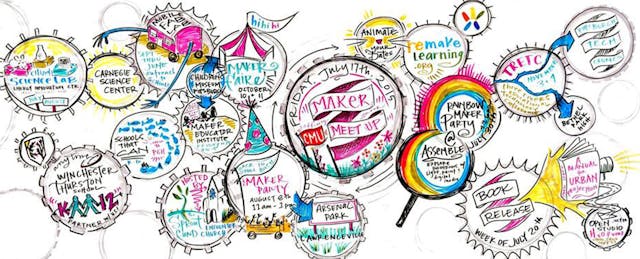Last year, Pittsburgh went to the White House. This year, the White House came to Pittsburgh.
About a year ago, on Monday, June 15, 2015, the White House hosted a Maker Education Roundtable discussion with over sixty educators, innovators, White House officials, non-profit organizations, foundations and more. And although all areas of the country were represented, the city of Pittsburgh had the largest presence—and the White House noticed.
Fast-forward to now, and on May 9, 2016 at Google Pittsburgh, Thomas Kalil, deputy director of policy for the White House Office of Science and Technology Policy, told an audience of local Pittsburgh dignitaries, philanthropists and educators, “You really are a model for the country.”
So, what sets Pittsburgh apart? It’s a event called Remake Learning Days, a week-long celebration showcasing maker projects throughout the region.
The Impetus Behind Remake Learning Days
Remake Learning is a professional network of educators and innovators working together to shape the future of teaching and learning in the Greater Pittsburgh Region. Pittsburgh Mayor Bill Peduto, often referred to by others as the “Maker Mayor,” credited the Remake Learning Network with fueling Pittsburgh's transition from “the City of Steel to the City of Learning.”
Representing more than 250 organizations, including early learning centers and schools, museums and libraries, after school programs and community nonprofits, colleges and universities, ed-tech startups and major employers, philanthropies and civic leaders, Remake Learning is collaborative effort to inspire and empower a generation of lifelong learners in Pittsburgh, West Virginia, and beyond.
The first big initiative? Remake Learning Days, which spanned nearly 300 events taking place across the region—from libraries and laboratories to schools and startups to radio stations and gardens—all united to spotlight local innovations in learning and teaching. Remake Learning Days featured dozens of Maker Events, including Fab SLAM at the Carnegie Science Center, Ohio River Maker Faire, and various events at the MAKESHOP at the Children’s Museum of Pittsburgh.
It Takes a Village
Citywide maker efforts aren’t easy with one organization at the forefront, but with Remake, the beauty is in the collaboration.
Over 100 organizations in the Remake Learning Network have made more than 150 commitments to accelerate relevant, hands-on learning in 2016. These commitments include $25 million and in investments from philanthropies, businesses and governments to support 21st century learning across southwest Pennsylvania and West Virginia.
Take some of these example maker commitments: Digital Promise and Maker Ed, for example, have committed to recruiting over 100 Pittsburgh-area schools to sign the Maker Promise. Elsewhere in the city, the Pittsburgh Association for the Education of Young Children (PAEYC) will host six professional development “Unconferences” in collaboration with innovative partners from across the region, exploring topics such as the role of making, nature play and the arts in early childhood. And Assemble, a makerspace that fosters learning and creativity, will offer experiential learning to promote creative thinking through making; the organization plans to connect 2,000 students to artists, technologists, and makers via workshops and engagements.
Tips for Taking Maker Ed Citywide
The greater Pittsburgh community is unique because of its locally controlled school districts, world-renowned museums, foundations and civic support, libraries, and dedicated community members engaged to remake learning. However, every city has its own offerings, and those can vary. If you’re interested in taking the MakerEd movement to the next level in your own community, here are a few tips:
- Be a Champion: Be the influential voice in your community, and encourage others to get involved. A champion could be an administrator, teacher, community leader, parent, business leader, or a student.
- Involve the Community: Create a maker movement for the entire community by involving local parent association groups, museums, libraries, pre-schools, and more.
- Make it Inter-Generational: Making is not only for students; making is for everyone. Hence, make MakerED events accessible to adults—specifically, parents and grandparents. For example, Avonworth School District recently hosted a “Maker Adult Party” featuring circuit flashlights, laser engraving, quilling and cartooning.
- Document and Share: In the fall of 2016, the Montour School District will create a digital MakerED guidebook using Google Slides to support its new Primary Mobile Maker Kit initiative, showcasing best practices by the Montour community. The guidebook will include open MakerEd resources, classroom prompts, and ideas for tools.
- Celebrate Successes: This is the most important step. Celebrate big (or little!) accomplishments in your making journey. For example, encourage people or organizations to use social media, or involve student news teams, or local or state civic representatives.
Finally, take a play out of Pittsburgh’s Remake Learning Playbook. Created by The Sprout Fund through an open source digital platform and hard copy book, the Playbook serves as a how-to-guide for replicating successful innovations including MakerEd. The Playbook is full of ideas and resources for formal and informal educators with the goal to remake learning in their city.
Remember: at the end of the day, we are all makers. Let’s participate together with our students and encourage exploration, allowing the use of creativity to solve problems. After all, since we cannot control the future, let’s make it together. What are you going to make today?


